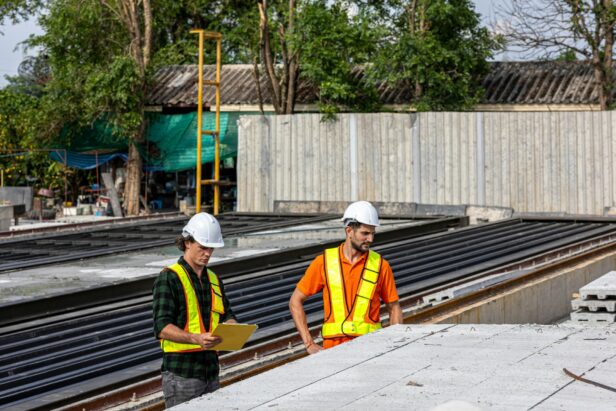When 80% of construction projects face delays or cost overruns, choosing the right general contractor becomes critical to project success. Local general contractors bring distinct advantages that can transform your construction experience from stressful to streamlined.
We understand local building codes, maintain established relationships with trusted subcontractors and vendors, and provide the proximity needed for hands-on project management. This article explores how partnering with local expertise delivers faster permits, better pricing, and reduced risk while maintaining the quality standards your project demands.
How Do Local Relationships Improve Planning, Pricing, And Procurement?

Local general contractors maintain established connections with area vendors and subcontractors that extend beyond basic transactions. These relationships create access to quality materials, reliable crews, and preferential treatment during busy periods. When supply chains tighten or schedules compress, local contractors often receive priority allocation from suppliers who value long-term partnerships over one-time orders.
Strong vendor relationships also enable flexible material procurement strategies. Local contractors can negotiate better pricing through volume purchasing agreements and payment terms that reflect their established credit history. They understand which suppliers deliver consistently and which materials perform best in regional climate conditions, reducing the risk of specification errors or performance issues.
Local Knowledge Supports Flexible Project Planning
Regional contractors understand how local weather patterns, soil conditions, and seasonal factors affect construction schedules. This knowledge allows for more accurate timeline development and contingency planning. When unexpected site conditions arise, local contractors can quickly identify alternative approaches or materials that work within local constraints.
Value engineering opportunities become more apparent when contractors know local market conditions well. They can suggest design modifications that reduce costs without compromising quality, often drawing from experience with similar projects in the area. Effective contractor-supplier relationships enable these collaborative improvements throughout the project lifecycle.
Proximity Improves Oversight And Response Times
Geographic closeness to project sites enables more frequent and thorough oversight. Local contractors can respond quickly to issues, coordinate deliveries more effectively, and maintain better communication with on-site teams. This proximity reduces travel time and allows for multiple site visits without significant cost impact.
Response times for emergency situations or critical decisions improve dramatically when contractors operate within their local market. Whether addressing weather-related delays, coordinating utility connections, or managing inspection schedules, local knowledge and proximity combine to keep projects moving forward efficiently.
Market Understanding Supports Better Early Budgets
Local contractors possess current knowledge of area labor rates, material pricing trends, and subcontractor availability. This understanding translates into more accurate early budgets and realistic project timelines. They know which trades are in high demand and can adjust schedules accordingly to avoid premium pricing.
Understanding local labor markets also helps contractors plan for workforce availability throughout different project phases. They can anticipate seasonal fluctuations, identify potential crew conflicts with other area projects, and develop staffing strategies that maintain consistent progress without cost premiums.
How Does Local Expertise Reduce Risk and Improve Compliance?
Risk mitigation becomes significantly more manageable when working with local general contractors who understand regional requirements. We navigate permit applications and coordinate inspections with jurisdictions having authority because our teams interact with these offices regularly. This familiarity streamlines approval processes and reduces the likelihood of unexpected delays that can derail project timelines.
Building codes vary considerably between municipalities, and local knowledge proves essential for maintaining legal compliance. We stay current with code changes in our market areas, ensuring construction details meet current standards before work begins. This proactive approach prevents costly rework and keeps projects moving forward without compliance-related interruptions.
Licensing and Insurance Protection
Proper licensing and insurance coverage create a protective barrier for property owners throughout the construction process. Local general contractors maintain current licenses specific to their service areas, demonstrating compliance with state and municipal requirements. Our insurance policies cover general liability, workers’ compensation, and professional liability to protect owners from potential claims.
These credentials matter because they transfer significant liability away from property owners. When accidents occur or disputes arise, properly insured contractors handle claims through their coverage rather than exposing owners to direct financial risk. We verify that our subcontractors carry appropriate insurance as well, creating multiple layers of protection.
Worksite Safety and OSHA Compliance
Strong safety practices and OSHA standards form the foundation of our approach to jobsite risk management. We implement accident prevention programs that provide for frequent and regular inspection of jobsites, materials, and equipment as required by federal construction standards. These programs identify hazards before they create incidents.
Regular safety training keeps our teams current with evolving regulations and best practices. We document safety procedures, conduct toolbox talks, and maintain records that demonstrate compliance with OSHA requirements. This systematic approach reduces insurance claims, prevents work stoppages, and protects both workers and property owners from liability exposure.
Local expertise in jurisdictional processes helps prevent delays that create additional risk exposure. We understand how different building departments operate, which inspectors prefer specific documentation, and how to expedite approvals when schedules tighten. This knowledge keeps projects on track and reduces the financial risks associated with extended construction periods.
How Do Local General Contractors Keep Schedules And Communication On Track?

Local general contractors maintain schedule control through proactive communication and hands-on project management. We handle daily coordination with subcontractors, suppliers, and inspection authorities while keeping owners informed at every milestone. Our proximity to the jobsite allows for real-time adjustments when challenges emerge, preventing minor issues from becoming costly delays.
Single Point Of Contact Streamlines Decision-Making
We serve as the central hub for all project communications. Property owners work directly with our project managers rather than juggling calls from multiple subcontractors, suppliers, and inspectors. This unified approach eliminates confusion and ensures consistent messaging across all project stakeholders.
When change requests arise or decisions need approval, we coordinate with the owner and provide clear recommendations based on our experience in the industry. Our project managers understand local market conditions and can quickly assess how modifications impact timeline, budget, and quality standards. This streamlined communication prevents the back-and-forth that often delays national contractors who lack direct relationships with local suppliers and trade partners.
Proactive Progress Updates Keep Projects Moving
Regular progress updates help prevent surprises and maintain momentum. We provide weekly status reports detailing completed work, upcoming milestones, and any potential challenges on the horizon. Our updates include photos, material delivery schedules, and coordination plans for the following week’s activities.
These communications go beyond simple progress tracking. We highlight critical path items that could impact the overall timeline and explain how we’re managing dependencies between different trades. When weather delays concrete pours or material shortages affect delivery schedules, owners receive immediate notification along with our revised coordination plan. This transparency allows for informed decision-making and maintains trust throughout the construction process.
Daily Management Of Subcontractors And Materials
We coordinate subcontractor schedules to ensure smooth workflow between trades. Our project managers know which electrical rough-in tasks must complete before drywall installation and how HVAC ductwork coordinates with structural elements. This sequencing knowledge prevents conflicts that can halt progress and increase costs.
Material procurement receives equal attention. We track delivery schedules for concrete, steel, roofing materials, and specialty items to ensure they arrive when needed. Our relationships with local suppliers provide flexibility when last-minute changes or expedited deliveries become necessary. This daily coordination prevents the material shortages and subcontractor conflicts that commonly derail construction timelines.
Rapid Troubleshooting Through Local Knowledge
Local expertise accelerates problem resolution. We understand regional weather patterns, soil conditions, and utility layouts that affect construction progress. When unexpected site conditions emerge or weather delays threaten critical activities, we have contingency plans ready based on similar projects in the area.
Our familiarity with local building departments streamlines inspection scheduling and issue resolution. We know which inspectors focus on specific code requirements and how to address their concerns efficiently. This knowledge prevents the delays and rework that occur when contractors are unfamiliar with local inspection procedures and preferences.
Quality assurance happens continuously rather than at project milestones. Our project managers conduct daily site walks to identify potential issues before they impact schedule or budget. When problems arise, we implement corrections immediately rather than waiting for formal inspection cycles. This proactive approach maintains project momentum and prevents small issues from compounding into major delays.
Local vs. National: When Does Each Make Sense?
The choice between local and national general contractors centers on your development priorities and project scope. Local GCs deliver site-specific expertise that proves invaluable for single-site projects or developers entering new markets. National partners excel when you need to execute multiple projects across regions with consistent processes and quality standards.
Local General Contractors: Deep Market Integration
We see local contractors bring unmatched depth in building code knowledge and regulatory navigation. Their established relationships with local jurisdictions mean faster permit approvals and smoother inspection processes. When construction schedules depend on quick regulatory turnarounds, this local expertise can save weeks.
Local pricing insight gives these contractors an edge in early budgeting accuracy. They understand seasonal labor fluctuations, material supplier pricing cycles, and regional cost drivers that affect project economics. Their subcontractor networks consist of proven local crews who know the area’s construction challenges and site conditions.
Proximity to jobsites enhances oversight capabilities. Local contractors can respond quickly to weather delays, material delivery issues, or design adjustments. This responsiveness translates into better schedule control and quality assurance throughout construction phases.
National General Contractors: Scale and Consistency
National partners bring scalability advantages for multi-site rollouts. They maintain consistent teams, processes, and quality standards across markets. This consistency proves critical when developers need uniform brand execution or standardized construction specifications.
These firms can leverage traveling subcontractors to address regional cost spikes or labor shortages. Their broader perspective on construction costs supports more accurate early budgeting for multi-market expansions. National contractors often have established protocols for change management and project documentation that streamline operations across multiple sites.
However, national firms may lack the deep local relationships that facilitate smooth permitting and inspection processes. They might need time to understand local procedures and build vendor relationships in new markets, potentially affecting initial project timelines.
Making The Strategic Choice
Single-site developments benefit most from local contractor expertise. The regulatory knowledge, established vendor relationships, and proximity advantages outweigh the benefits of national scale. Local contractors excel when permitting complexity, site-specific challenges, or community relationships drive project success.
Multi-site rollouts favor national partners when consistency and operational efficiency matter more than local market nuances. If your development strategy requires identical execution across markets with tight timelines, national contractors provide the systems and scale needed for successful delivery.
Consider hybrid approaches for complex scenarios. Some developers partner with national firms for standardized components while engaging local contractors for site preparation, permits, and specialty work requiring local expertise. This strategy captures both scale advantages and local market knowledge.
Conclusion and Next Steps

Local general contractors bring measurable advantages to your development projects. Their established vendor relationships secure reliable material flows and competitive pricing. Deep knowledge of local building codes accelerates permit approvals and reduces compliance delays. Direct proximity to jobsites enables rapid response to issues and maintains project momentum.
These strengths translate to tangible project benefits. Streamlined planning processes reduce early-stage delays. Proactive schedule control minimizes disruptions. Clear communication channels keep stakeholders aligned throughout construction phases. Quality oversight remains consistent from groundbreaking through final inspections.
Your Contractor Selection Process
Begin by shortlisting contractors with proven experience in projects similar to yours. Verify current licensing status through your state licensing board and confirm active general liability and workers’ compensation insurance. For larger projects, assess bonding capacity to ensure financial protection throughout construction.
Request detailed references from recent similar projects. Ask specific questions about project management approach, daily oversight procedures, and delay response protocols. Evaluate their safety practices and OSHA compliance records. These conversations reveal how they handle real-world construction challenges.
Evaluating Proposals
Review bids for transparent bidding practices and realistic allowances. Clear scope definitions prevent costly change orders later. Examine their communication plan and identify who manages day-to-day operations. Strong proposals outline specific milestones, inspection schedules, and quality control measures.
Compare how each contractor addresses your specific site conditions and regulatory requirements. The right partner combines local expertise with professional project delivery systems that align with your timeline and quality expectations.
Ready to move forward with your construction project? Contact EB3 Construction to discuss how our local expertise can support your development goals.




